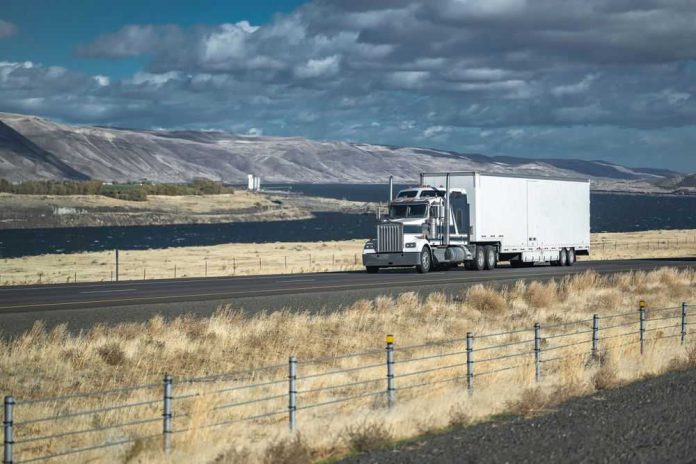
New visa policies under the Trump administration are poised to reshape the trucking industry, potentially threatening the livelihoods of foreign drivers while aiming to bolster American truckers.
Story Snapshot
- Trump administration pauses new visas for foreign truck drivers.
- Policy changes follow a fatal crash involving an undocumented driver.
- Measures aim to protect American truckers and improve road safety.
- Restrictions face criticism for potential supply chain disruptions.
Trump’s New Visa Policies Target Foreign Truck Drivers
Secretary of State Marco Rubio announced a suspension of new visas for foreign commercial truck drivers on August 22, 2025. This measure targets H-2B temporary worker visas, E-2 investor visas, and EB-3 skilled worker visas. Transportation Secretary Sean P. Duffy further introduced stringent requirements for non-domiciled commercial driver’s licenses, mandating employment-based visas and federal immigration status verification. These actions are part of a broader effort to enhance road safety and prioritize American workers.
The policy shift came after a tragic highway accident in Florida involving an undocumented truck driver, spurring immediate political and public reaction. The Trump administration argues that foreign drivers pose risks to American safety and economic interests. However, the affected driver population is relatively small compared to the overall industry size, raising questions about the proportionality and effectiveness of these measures.
Impact on the American Trucking Industry
The trucking industry is already grappling with a significant driver shortage, costing approximately $100 million in weekly revenue losses. While the Trump administration’s policies aim to protect domestic truckers, the actual economic impact on their wages remains unclear. Critics argue that the restrictions could exacerbate supply chain vulnerabilities, leading to higher grocery prices and slower deliveries, which might offset any potential wage gains for American drivers.
The American Trucking Associations (ATA) supports the visa pause, emphasizing the need for stringent training standards for foreign drivers. However, they also acknowledge the potential for worsened workforce shortages as a result of these restrictions. The ATA’s stance highlights the complex balance between ensuring safety and maintaining an adequate labor supply.
State-Level Conflicts and Compliance Challenges
California Governor Gavin Newsom’s administration has resisted federal enforcement measures, pointing out that California’s commercial drivers have a significantly lower fatal accident rate than the national average. This resistance led to the Trump administration withholding $40 million in federal funding from California, citing the state’s refusal to enforce English proficiency requirements for truck drivers. The situation underscores the ongoing tension between state and federal authorities in implementing these policies.
Ultimately, the Trump administration’s crackdown on foreign truck drivers reflects a broader agenda to prioritize American employment and safety. However, the lack of concrete evidence supporting wage increases for American truckers suggests that the policy’s economic benefits may be more aspirational than realized at this stage.
Sources:
An Uncertain Road: The Trump Administration’s Pause on New Visas for Commercial Truck Drivers
US Pauses Work Visas for Foreign Truck Drivers
Trump’s Transportation Secretary Sean P. Duffy Takes Emergency Action to Protect America’s Roads
Trump Administration Withholds $40M from California Over Trucker English Proficiency Rules











